FOREIGN NEWS
Humanitarian Crisis As 71,000+ Missing In Africa, Families Desperate

The International Committee of the Red Cross (ICRC) reports that over 71,000 people in Africa are missing, a 75% increase from the previous year.
According to an ICRC statement issued on Friday, Africa has the highest number of missing persons, unaccompanied children, and family reunifications, based on registered cases as of the end of June.
Patrick Youssef, ICRC’s regional director for Africa, stated: “The issue of missing persons, including those forcibly disappeared, remains one of the most damaging and long-lasting humanitarian consequences of armed conflicts and other situations of violence, for all loved ones, whether a waiting wife or a heartbroken son,” emphasising that: “Behind every missing person, there are countless more suffering from anguish and uncertainty. It is a humanitarian tragedy for families, with ramifications for the entire society.”
According to the statement, long-running armed conflicts in Africa have resulted in the disappearance of thousands. Natural disasters are also common on the continent, some of which are exacerbated by climate change, and perilous migration routes put vulnerable people at risk of separation and disappearance.
The International Day of the Disappeared, observed on August 30, raises awareness of the plight of the missing, honours their memories and families’ emotional distress, and draws attention to the need to help prevent and respond to the issue of missing persons.
The International Committee of the Red Cross calls for a more determined international effort to prevent and respond to missing persons, regardless of the circumstances. Political will is required to obtain the resources needed to address this issue, as is cooperation among authorities both at the national and international levels.
Youssef stated that “in armed conflict, both civilians and combatants go missing,” adding that “they can go missing when they are arrested or captured, detained, and held incommunicado.” They may still be alive, but they lack the means to communicate with their relatives.”
According to international humanitarian law, state authorities have the primary responsibility to determine the fate and whereabouts of missing people. These authorities, however, may lack the necessary resources, knowledge, and political will. The International Committee of the Red Cross and the National Societies can play important roles.
In Nigeria, the ICRC reported approximately 24,000 people missing, which is most likely only a fraction of the total. More than half of the cases involved children who had gone missing. In the northeastern states of Borno, Adamawa, and Yobe, for example, Nigerian Red Cross volunteers have been delivering Red Cross Messages to many families who have lost contact with their loved ones as a result of the armed conflict. The ICRC helps families with mental health issues, legal advice, and, in some cases, financial assistance.
-
CRIME3 years ago
PSC Dismisses DCP Abba Kyari, To Be Prosecuted Over Alleged $1.1m Fraud
-
FEATURED3 years ago
2022 Will Brighten Possibility Of Osinbajo Presidency, Says TPP
-
FEATURED2 years ago
Buhari’s Ministers, CEOs Should Be Held Accountable Along With Emefiele, Says Timi Frank
-
BUSINESS & ECONOMY2 years ago
Oyedemi Reigns As 2023’s Real Estate Humanitarian Of The Year
-
SPORTS1 year ago
BREAKING: Jürgen Klopp Quits Liverpool As Manager At End Of Season
-
SPORTS2 years ago
Could Liverpool Afford Kylian Mbappe For €200 million? Wages, Transfer Fee
-
ENTERTAINMENT2 years ago
Veteran Nigerian Musician, Basil Akalonu Dies At 72
-
FEATURED2 years ago
Tribunal Judgement: Peter Obi Warns Of Vanishing Electoral Jurisprudence, Heads To Supreme Court
-
BUSINESS & ECONOMY2 years ago
Oyedemi Bags ‘Next Bulls Award’ As BusinessDay Celebrates Top 25 CEOs/ Business Leaders
-
FEATURED3 years ago
2023 Presidency: South East PDP Aspirants Unite, Demand Party Ticket For Zone



































